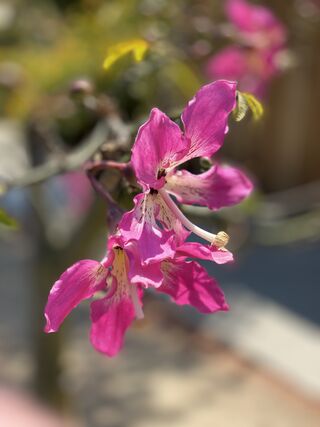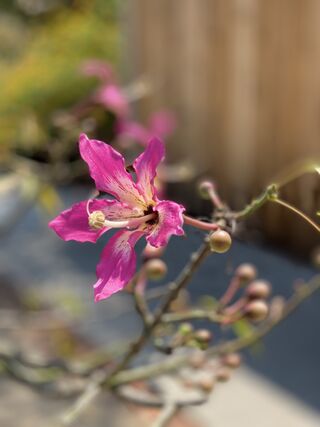Resilience
What Nature Can Teach Us About Resilience
Whether facing positive or challenging circumstances, change remains constant.
Posted September 12, 2020 Reviewed by Gary Drevitch

There is a lone Chorisia Speciosa Floss-Silk Tree in my neighborhood that blooms only once a year. This is a tree I regularly pass when walking my dog, Latte. While early autumn results in brilliant flowers on the tree, it remains dormant and bare throughout the rest of the year.
I remember this past winter, walking by the tree’s stark, empty branches just days after my husband had abruptly lost his job. We were crushed, scared, and unsure of how things would right themselves — and not yet knowing that the coronavirus pandemic was around the corner, which would add even more challenge to the job hunt we were already facing.
And so on that chilly January day, I stood before the tree and took note of its bare, lifeless branches—no blooms to behold. Since I was beset with upsetting news, I decided the tree looked too lifeless, too baron to ever blossom again. I then remembered thinking that every year around this time I’d decided the tree wouldn’t bloom again even though I’d walked past it enough autumns to see that its flowers always returned on the regular.
After a moment, while standing there with Latte on that cold winter day, I took a deep breath and assured myself, “When this tree flowers again, a lot will have changed and this current state of dread will be behind us.” In other words, I gently reminded myself that there was reason for hope. Time would go by. Life would go on. And (hopefully) positive changes would occur. The tree would bloom again. . . and so would our household, job-wise.
As this current autumn returns and the tree has once again brought forth brilliant flowers, change has occurred. My husband now has a job that he’s really enjoying, miraculously secured during the days of the pandemic. Of course, other changes have come our way as well, not all of them stellar or necessarily welcomed. But here these flowers are—reminding us that change is constant. And so is hope.
Too often we get caught up in the emotions and panic that come with sudden bad news or a switch in circumstances we weren’t expecting or flat out didn’t want. When people tell us that with time the change might prove to be for the best, we sometimes want to plug our ears and ignore them. The fear, pain, and unknowing are all too real. But time does march on, whether we want to acknowledge it or not.
Of course, time doesn’t always proceed at the pace we might desire, especially when in the throes of what seems like a dire situation. And we sometimes need to be careful to not react in a way that reveals more of our angst than it does our acceptance of the volatile situation at hand.
Sometimes the unknown can offer more stress and fear than a particular situation we have to face or tackle. During these days of quarantining and locking down, none of us can be sure where different aspects of society are headed.
Similarly, even good news or current states of joy can be fleeting. Another reminder to stay present, soak in “What is,” and know that everything is evolving and that change is not only constant but imminent.

This is where taking some deep breaths and encouraging our own mindfulness comes in. If you don’t have a meditation practice, this might be a helpful time to begin one. The less we deny what’s going on and the more acceptance we embody, the sooner we can allow life to go on, which can lead to new and, perhaps, unexpected options.
But we needn’t rely entirely on our own psyche. Challenging situations and times offer a chance to look for guidance from nature, which can include a very unique tree that we think might never bloom again.
The gorgeous, once-a-year flowers on the Chorisia Speciosa do return. They remind us that life is a cycle. And that if we stay present while remembering change is coming, we—even if currently dormant in our own way—will also surely bloom again. And brilliantly at that.


